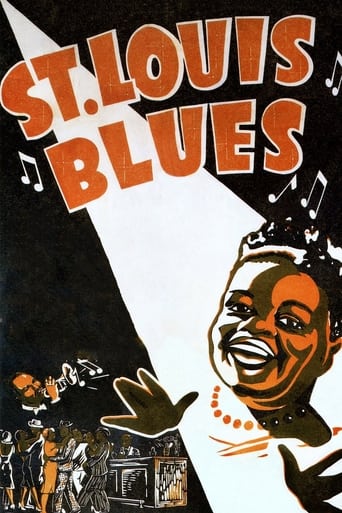



Good start, but then it gets ruined
It is interesting even when nothing much happens, which is for most of its 3-hour running time. Read full review
View MoreThis is one of the best movies I’ve seen in a very long time. You have to go and see this on the big screen.
View MoreThere's a more than satisfactory amount of boom-boom in the movie's trim running time.
View MoreThis short subject made right at the beginning of the talkie era is the only film featuring the legendary blues singer Bessie Smith. The skimpy plot of this film has Bessie's no good gambling man being caught by Bessie in the arms of Isabel Washington. As this slick crapshooting man leaves Bessie she breaks into her lament, the St. Louis Blues.After which there's a large production number where the Hall Johnson Choir is used in a large production number which while not done with the kind of values that Busby Berkeley had still was quite good. I'm sure the black cinema people who made this film at RKO didn't have a tenth of what Berkeley spent in 42nd Street.Thank God this treasure was preserved.
View MoreThere's a legend around the sad lives of some of the early black performers who are looked back on in reverence at the sadness of their lives but the joy of their talents. One of the unsung legends now is Bessie Smith, somewhat overshadowed by Billie Holliday. But thanks to the Broadway musical revue "Me and Bessie" and a recent TV movie, those who might not have heard of her have gotten to discover the artist behind the sad woman. This short is a rare glimpse into the talents of the real deal, playing a long- suffering lady who discovers her no good man with another woman. After beating the floozie up, she pleads with the bum of a boyfriend not to leave her, and ends up singin' the blues when he tosses her aside. Smith is accompanied by the Hall Johnson choir in what seems like her personal prayer. The short ends on a truly downbeat note that had my jaw dropping in horror.
View MoreBessie Smith is a legendary Black entertainer from the Harlem Renaissance. However, sadly, this is the ONLY known film in which she appeared. So, for historical reasons, this short if like gold. Now I am sure some might not agree--as the film shows Black people gambling and carousing and doing a lot of stereotypical behaviors. However, this was THE predominate view given in both Black and White-produced films of the time and you can't expect a lot of enlightenment back in 1929. It is a portrait of who we were as a nation at the time and who we wanted us to be--and I say just accept it as a little window into the times and way people thought. Plus, remember, this is still the only way to watch Smith perform...so deal with it! "St. Louis Blues" gets its name from the famous W.C. Handy song of the same title. It consists of Smith arguing with her gambling and carousing boyfriend as well as Smith smacking the crap out of one of Jimmy's floozies! He slaps her around and mistreats her...yet she begs him not to leave. I KNOW this is very negative--a terrible message for women then and now. BUT, as I said, it is what it is. What follows is Smith singing her very famous tune "My Man"--and she sings it with a lot of soul and style. It also is an interesting short because it plays much less like a typical music video of the age but like a mini-movie. Smith was some talent and it's a great window into the times--warts and all.
View MoreSee why Bessie Smith was called the "Empress of the Blues" in this early sound short. An actress she was not, but the power and expression conveyed in her singing voice as she belts out the W.C. Handy composition of the title track is incredible. This film also gives you a rare glimpse of the talent of Jimmy Mordecai. One could only imagine what they could have accomplished had they been given the opportunity afforded other actors of their time.
View More